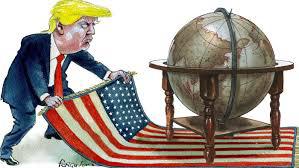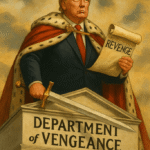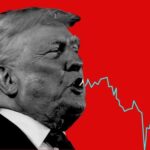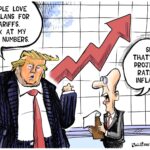Trump is creating a new world order that will shrink America’s role and influence. He’s forced countries across the globe to become more independent of America for military, financial and political support and diminish America’s access to global trade. But, as dependence on America fades, so will America’s influence and leverage.
After World War II, America led the world in adopting economic rules that built an international trading order, a stable world economy and geopolitical calm, all anchored by American stuardship that Washington viewed as vital to its own prosperity and strategic interests.
That order is being trashed by President Trump who prefers using America’s strengths to bully other countries into submission rather than build win-win relationships that engender cooperation.
For example, Trump effectively joined Putin’s team in the war in Ukraine and bullied Ukraine into handing Putin a win and a pass to invade NATO members. Trump:
- Excluded Zelensky from peace talks with Putin and warned Zelensky that he either takes their deal, or “the U.S. is out.”
- Agreed that any peace deal require that:
- Europe be defended and funded by Europe and not the United States,
- The demilitarization of Ukraine,
- Prohibits Ukraine from joining NATO and regaining any territory lost during the war, and
- Requires new elections, enabling Putin to install a puppet government.
- Trump paused all military aid to Ukraine.; although, he recently resumed it due to stalled negotiations with Putin. The pause however alarmed NATO members as it reflected what Trump would do if peace talks progressed … or even if they didn’t.
Now that Trump has shown a willingness to leave NATO to its own devices, NATO and non-NATO European members are acquiring more conventional and advanced weapons and lasting stocks of ammunition, and building larger armies to prepare for a Putin invasion. As former US Secretaries of State and Defense, Condoleezza Rice and Robert Gates warned, “to avoid confrontation with Russia the U.S. must help Ukraine push back the invader now…. If this lesson is ignored and Ukraine is defeated, Russia will almost certainly … attack NATO member countries.”
The EU launched its military independence from America with150-billion-euro military procurement that largely excludes U.S. companies. Portugal is considering the cancellation of the acquisition of F-35s from the U.S., as Canada reassess plans to purchase 88 of the same.
Now, imagine a Russian invasion of the Baltic NATO members. Like Ukraine, they were formerly part of the Soviet Union and are home to many ethnic Russians. The invasions would subject Europe to Russian bullying and force our allies to acquiesce to Russian demands. More importantly, the continent would live in fear of further Russian adventurism.
America will be blamed for Europe’s peril. Its trust in America’s government and, yes, its electorate, will not easily heal.
Trump’s helter skelter tariff barrage is diminishing our access to global trade. He’s forced our trading partners to seek other buyers of our exports. Beijing prepared well for the trade war. As the world dealt with the the chaos unleashed by the tariffs on almost all U.S. trading partners, Xi went on a marketing spree through Southeast Asia, warning, “A trade war and tariff war will produce no winner…. Our two countries should safeguard the multilateral trading system, stable global industrial and supply chains, and an open and cooperative international environment.” In other words, he urged trading partners to help maintain the global order that Trump is in the process of trashing.
Xi pushed businesses to strengthen supply chains without an American links and to develop overseas markets outside the United States. He also made it illegal for companies to comply with U.S. sanctions. Xi’s stunning ability to organize and prepare his country compared to Trump’s impulsive and thoughtless decisions explain China’s advantage.
Trump sacrificed America’s trading edge over China during his first administration when he pulled out of the he Trans-Pacific Partnership (TPP) – a trade agreement with eleven pacific rim countries that excluded China. It eliminated 18,000 tariffs on all American-manufactured goods and most agricultural products. It also provided for stronger labor standards in Asia and environmental protections that put state-owned enterprises on a level playing field with U.S. business. But Trump, without knowing what was in it, whipped up his base by calling TPP a rape of our country and then abandoned it. China stepped in and replaced us with the CPTPP, a trade agreement with the prior TPP members that excluded America and left China free to bully its neighbors, which sowed distrust of America in the region.
CPTPP does more than reduce tariffs on goods. It sets rules on e-commerce, and the protection of intellectual property. It enforces core labor rights, including the right to form trade unions. And it prohibits subsidizing state-owned enterprises that disadvantages foreign competitors.
The CPTPP was an in-your-face reply to Trump’s rejection of TPP and showed that countries can reduce exposure to U.S and, more importantly, deomonstrating that global rulemaking can proceed without American participation or consent.
Even though the Europeans have their own free-trade zone, they are nevertheless seeking to establish more free-trade relationships with partners other than the United States to deal with the unpredictability of what Trump will do next.
The distrust created by Trump’s abandonment of TPP still lingers. And combined with Trump’s aggressive tariffs and threatened military betrayal of NATO and Ukraine, it stoked doubt that America will defend Taiwan.
That distrust has pushed Japan and South Korea, both strong U.S. allies, to seek closer relationships with China. The three countries entered high-level negotiations toward a free-trade deal that would build “a predictable trade and investment environment.” Trump can take credit for bringing two staunch allies closer to our number one enemy. It would be a considerable (if unintended) achievement by Trump. Japan and Korea host significant U.S. military bases. If they doubt that Washington will defend Taiwan, making it harder to manage their own defenses, it could push both countries into building their own nuclear deterrents.
In freezing America’s foreign aid programs, Trump has alienated its beneficiaries, threatening their willingness to continue hosting our military bases, and their strong appetites for American exports. Over the past 10 years, nearly two-thirds of the growth in U.S. exports went to major recipients of U.S. aid.
As trade meanders away from the United States so could the currency paid meander away from the dollar. Although its dominance would make the dollar extremely difficult to replace, a diminution of the dollar’s role in international trade might be considered an opportunity to do so. After all, the value of the dollar is based on the American economy being the world’s strongest. Sadly, a Trump economy may be quite different.
The only explanation for it all is that Trump just doesn’t know what he’s doing.Putin sees that Trump’s made America vulnerable from alienating America’s allies with rampant tariffs and from taking a wrecking ball to America’s government. Putin knows that he’s psychologically out of control — in one word, a sociopath. Too bad American voters don’t, and Republicans have decided to tolerate it.







